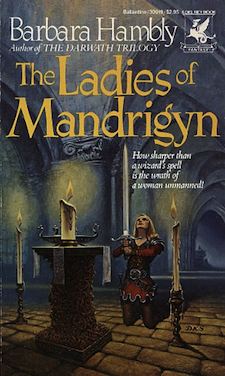The thing Barbara Hambly always does brilliantly is the way technology and economics and magic fit into cultures. It’s why I want her to write fantasy—I like her historical mysteries just fine, but they are set in the real world, and what I want from her more than anything else is the fantasy worldbuilding, because she does it just so well and so satisfyingly that it always makes me happy.
The Ladies of Mandrigyn (1984) is an early novel and the first of hers I read. It has a fascinating world. It’s a lot like Renaissance Italy, with warring city states and mercenary bands, except instead of being near to the Ottoman Empire, they’re near an evil wizard’s empire. And the evil wizard, Altiokis, is gobbling up city states one by one, and a woman from the most recently conquered one to fall, Mandrigyn, wants to hire mercenaries to get it free again. Sun Wolf, a barbarian from the northlands, is far too sensible to take an assignment like that. So he winds up taking a much worse one—kidnapped, poisoned, and training the ladies of Mandrigyn to fight against the wizard. (It has to be the ladies, because the men are either collaborators, dead, or slaves in the mines.)
Hambly wrote about writing it in her Livejournal recently, and about her own experience of learning to fight. This is a lot of what the book is about, the women learning to fight while Sun Wolf’s second in command, Starhawk, travels across country towards Mandrigyn, and Altiokis. But what draws me back to it is the way the economy works, the traders are actually trading, the mercenaries have to argue with their employers about being paid in devalued currency, the women in Mandrigyn have to take over the jobs because the men are missing.
More than that, there’s the magic. You see, Altiokis isn’t just an evil wizard. He’s a special kind of evil wizard, and for the last couple of hundred years he’s been wiping out all the other wizards he can find and destroying any books about magic, so that there’s pretty much no magical opposition to him. There are untrained mageborn people, who would have power if they knew what to do with it, and there’s the occasional person who has read some books and does a little magic in secret, but they still can’t do much because they don’t know what the Great Trial is, and they need the Great Trial to unlock their power.
The two things Sun Wolf’s father told him were “don’t mess with magic” and “don’t fall in love.” Naturally, the novel sees him doing both.
There are a lot of coincidences in The Ladies of Mandrigyn, and while the description of training is very accurate, there might be a little much of it. But she has thought through all the consequences of having mindless zombies in your army, and this was one of the first fantasies that really isn’t set in a generic fantasyland. It’s set in something that has borrowed from European history, but she’s thought hard about how the existence of magic makes it different, at tech level. There are some memorable characters, and a sweet romance.
This book has a very good and conclusive ending, and it stands completely alone. There are two sequels, which can be summed up as “Sun Wolf and Starhawk wander around trying to find someone who knows magic,” which is okay but a little unfocused. The economics and technology and magic continue to make sense, and this continues to be cool. This is one of the books that gave me hope for fantasy when I was about ready to give up on it.
Jo Walton is a science fiction and fantasy writer. She’s published two poetry collections and nine novels, most recently Among Others, and if you liked this post you will like it. She reads a lot, and blogs about it here regularly. She comes from Wales but lives in Montreal where the food and books are more varied.










